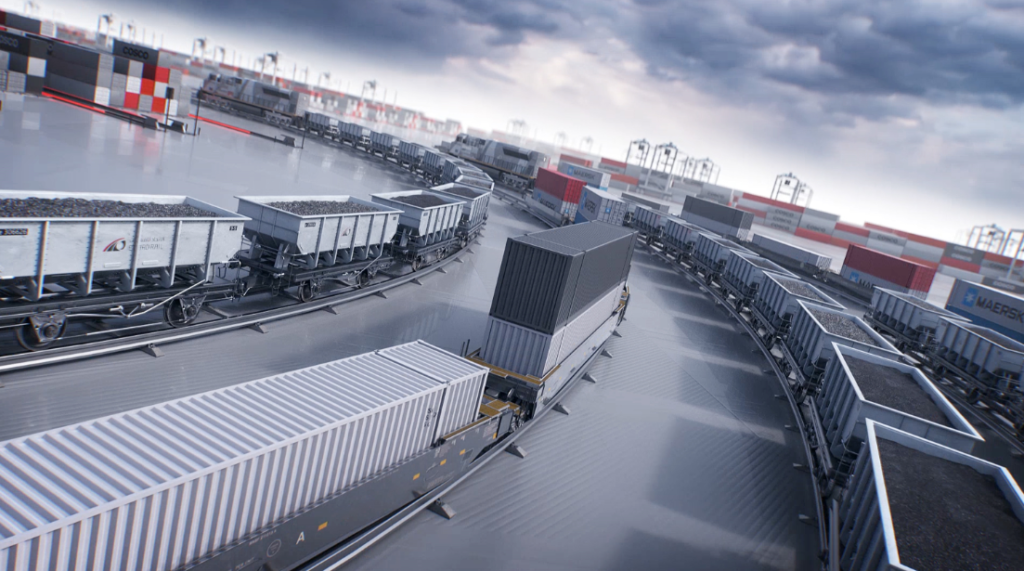Etihad Rail, the developer and operator of the UAE’s national railway, is tripling its fleet by announcing the award of a contract for the manufacture, supply and commissioning of 842 new wagons bringing its total fleet to more than 1000 units to serve the whole network. This expansion paves the way for the rail transport to become a principal platform for freight haulage in the UAE following the completion of Stage Two, as it connects the entire country.
The contract was awarded to CRRC Corporation Limited, a global leader in providing solutions for the sustainable development of the railway industry, during an on-line ceremony attended by His Highness Sheikh Theyab bin Mohamed bin Zayed Al Nahyan, Member of the Abu Dhabi Executive Council, Chairman of the Abu Dhabi Crown Prince’s Court and Chairman of Etihad Rail and Sun Yongcai, President of CRRC Corporation. The contract signing was conducted by Shadi Malak, CEO of Etihad Rail, and Wang Hongwei, Vice President of CRRC Yangtze Group, a subsidiary of CRRC Corporation Limited. Also present for the on-line event were senior officials and delegates from both companies.
His Highness Sheikh Theyab bin Mohamed Al Nahyan reviewed the overall construction work progress of Stage Two and witnessed the purchase approval of more than 800 additional wagons, increasing the rail’s annual transport capacity to reach 59M tonnes. Speaking on the announcement, His Highness stated: “Etihad Rail is building a sustainable national railway network designed to transform the UAE’s freight transport and logistics mode of operation by modernising the haulage map for the end users, customers as well as operators.”
“The national railway network is designed to cater to the needs of customers and related industrial sectors, as well as existing multi-modal transport systems. Etihad Rail, the operator of a new, modern, scalable, and reliable mode of transport, will directly support the vision of the UAE’s wise leadership for economic growth and sustainable transportation.”
The newly acquired wagons will be manufactured according to specific GCC requirements, including state-of-the-art breaking, signalling, and communications control and safety systems, while being tailor made for the specific regional environmental conditions in general and for the UAE in particular.
By tripling its wagons fleet, Etihad Rail’s annual transport capacity will increase by a factor of 8, reaching up to 59 million tonnes per annum, transporting cargo such as containerised and bulk freight, including petrochemicals, aggregates, construction related materials, industrial and perishable goods, waste, cement and all related construction materials, aluminium, perishable goods, as well as general cargo, both domestically and internationally.
The variety of wagon types will provide the necessary flexibility, schedule frequency, and scale required by the market, enabling users to reduce costs and increase efficiency. In addition, the increased utilisation of rail will reduce road congestion associated with truck movement as the sole current solution for transport mode for goods on land.
Stage Two of the Etihad Rail network is moving forward rapidly, as all contracts for the construction, civil works, Freight Facilities centres and the Operations and Maintenance headquarters have been awarded, plans approved, and ground broken on the Stage Two rail corridors.
When completed, Stage Two of the network will extend 605 kilometres from Ghuweifat on the border with Saudi Arabia to Fujairah and Khorfakkan on the UAE’s east coast, while connecting the ports of Jebel Ali in Dubai, Khalifa Port in Abu Dhabi, ICAD / Mussafah in Abu Dhabi and the Port of Fujairah, with the existing Stage One line at Ruwais, effectively uniting the major industrial ports and trading centres of the country while opening up cross-border rail traffic to the GCC.




